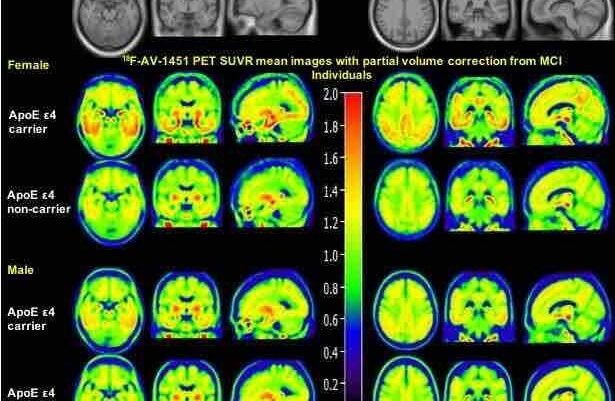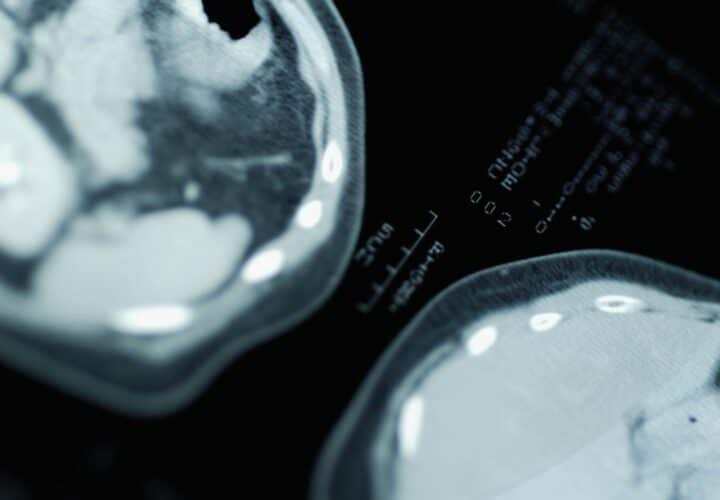The bad news? This gene variant increases Alzheimer’s risk. The good news: Knowing about your risk means extra time to learn the warning signs and address other risk factors.
A human being has as many as 25,000 different genes in their DNA. It’s wild to think that just one tiny little mutation can change their entire fate. The APOE gene is the human body’s instruction manual for building apolipoprotein, a protein that grabs and carries cholesterol throughout the body. Everyone carries two copies of this gene — and it comes in a few variants. One of these variants, APOE4, has been found to, in some populations, increase a person’s chances of developing cardiovascular disease — and Alzheimer’s disease.
With the rise of genetic testing, some people are learning they do, in fact, carry APOE4. Some people carry not just one, but two copies, which can boost Alzheimer’s risk even more.
Genetic testing isn’t necessarily the right choice for everyone. Experts warn that if you do open that figurative box, you may learn things you have a tough time navigating.
For biotech professional Wendy Nelson, learning about her Alzheimer’s risk through a 23&Me test fueled anxiety — and lots of questions.
“It is very disappointing and discouraging and depressing at first,” Nelson told Being Patient in a recent live talk. “I think it took me a little time to swallow that pill.”
However, she said, there are steps you can take to make sure you have the resources you need to understand and cope with the results. Getting the answers will empower you to make informed decisions about your health.
How does the APOE4 gene affect your health?
One copy of the APOE gene is inherited from each of your parents. If one of those copies is the APOE4 variant, it increases the risk of developing Alzheimer’s 25 percent. With two copies of APOE4, it increases the chances between three- and 12-fold.
But having two copies of APOE4, or being APOE4 homozygous, is relatively rare: About two to three percent of the population are APOE4 homozygous.
This doesn’t mean that everyone with this gene will develop Alzheimer’s. And it certainly doesn’t mean people with no copies of APOE4 won’t develop Alzheimer’s. The disease is a complicated one: Researchers have pinpointed dozens of genes, in addition to APOE, that are related to Alzheimer’s risk. Some raise risk. Others can have a protective effect. How these genes interact is a mystery, and then, genetics is only one of many factors that drive risk. One third of people with Alzheimer’s have no genetic biomarkers at all.
Race is also a factor: Most of what genetic experts currently know about APOE4 is drawn from studies conducted in predominantly white populations. In some groups like American Indians, scientists have recently found that carrying this gene is not associated with an increased risk of the disease.
But, for many people, one or two copies of APOE4 can be a wake-up call when it comes to brain health. “I’m a scientist, so I’m not going to just sit back and accept my likely fate,” Nelson said. “I wanted to figure out what I can do about it.”
What do you do if you carry the APOE4 gene?
If you find yourself carrying two copies of these genes, there are a few things you should know first and foremost. The test results do not mean you’ll definitely get Alzheimer’s and there are also ways for you to reduce the risk of the disease.
You may also need to take care of your mental health because it may lead to anxiety, post-traumatic stress disorder or depression. All of these mental health conditions also lead to cognitive problems.
“I have had to live with the anxiety of knowing,” Jamie Tyrone, an advocate who found out she carried two copies of the gene, told Being Patient. “I’m experiencing cognitive changes that are associated with normal aging, but because I got these results, in the back of my mind, I always have a fear that I could be getting Alzheimer’s.”
Like Nelson, many people who find they carry the APOE4 gene will start researching ways to lower their risk. “I have gone on low-level rosuvastatin to decrease cholesterol,” Nelson said. “There are more and more ties between cholesterol buildup and Alzheimer’s, [prevent build-up] has been known to be more helpful for younger folks.”
According to the latest research, there are eight risk factors accounting for one-third of total Alzheimer’s cases. But it is unclear to what extent some of these risks may be modified in practice.
Take for example the highest risk factor midlife obesity. Less than 15 percent of people are successful in shedding 5 percent of their body weight within a year while the chances of someone going from obese to a so-called normal weight is less than 1 percent. Other risk factors and lifestyle changes are a little easier to modify. This includes getting more exercise and eating a Mediterranean-style diet composed of legumes, fruits, vegetables, fish, and whole grains may reduce the risk of developing the disease.
In addition to mental health support and lifestyle changes, you can start planning ahead for when symptoms may start or participate in clinical trials that may unlock new treatments for the condition.
The big takeaway on APOE4
If you test positive for the APOE4 gene, you should seek out proper genetic counseling to prevent anxiety and stress.
“We’ll see a little increase in anxiety and feelings of stress,” Jessica Langbaum, co-director of the Alzheimer’s Prevention Initiative at the Banner Alzheimer’s Institute, told Being Patient, in a previous LiveTalk. “After the counseling, that usually dissipates and goes back to normal within six to 12 weeks after the session.”
Knowing you carry the genes can become empowering. “If you have the mindset that it will empower you to look for potential clinical trials or help for yourself, then by all means, do it,” Nelson said.
You also have the opportunity to participate in research that helps find better treatments. Participation means that you may receive a potential disease-modifying therapy before it hits the market.
To learn about clinical trials of new medications that aim to modify the pathology of Alzheimer’s disease, check out the Alzheimer’s Association Trial Match tool.





